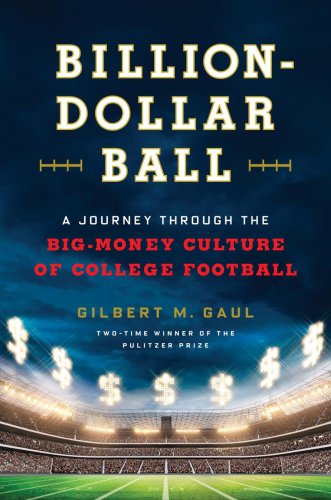
Billion-Dollar Ball
A Journey Through the Big-Money Culture of College Football
کتاب های مرتبط
- اطلاعات
- نقد و بررسی
- دیدگاه کاربران
نقد و بررسی

Starred review from June 8, 2015
A commercial entertainment juggernaut has conquered academe, argues this incisive, acerbic exposé of Division I college football. Pulitzer Prize–winning journalist Gaul (Free Ride: The Tax-Exempt Economy) surveys the powerhouse football programs that are essentially independent, hugely profitable companies and virtual “extensions of ESPN”; the multi-million dollar salaries and severance packages for superstar coaches with lackluster records; the barely literate players pampered with lavish tutoring (including nannies who make sure they go to class); sky-high (but tax-deductible) “donations” for choice stadium seats; and the cutthroat marketing jihads (the University of Alabama threatened legal action against a baker who decorated cookies with team colors, mascots, and the letter A). The hypocrisy of this grubby business masquerading as education is clear in Gaul’s telling, though it appears less harmful at powerhouse schools where football funds not only itself but the many women’s rowing teams that provide Title IX balance (visiting one, he discovers the true spirit of collegiate athletics). Gaul’s mix of shrewd financial analysis and colorful reportage makes for an engrossing account of America’s most sentimental yet mercenary sports culture.

June 15, 2015
Pulitzer Prize-winning reporter Gaul (Giant Steps, 1993) follows the money straight into the end zone, locker room, and alumni skybox. "The notional idea that college football is still a game, as opposed to an elaborately rich entertainment, is rapidly receding from the American landscape of sports," writes the author toward the end of an often aggrieved, often simply bemused account that finds him traveling the country to interview coaches, players, fundraisers, and assorted walk-on characters. Some of them have the quaint idea that college should be about academics and education; some maintain that football programs should bring money into the system rather than pumping it out; some even wonder why it is that in all but a few states the highest-paid public employee is the major college's football coach. Gaul is fearless in his pursuit, which finds him in Texas stadium parking lots on the verge (perhaps) of getting pounded by overly zealous fans or in Alabama being sized up by an unimpressed assistant athletic director who's certain that Gaul is "going to call us all a bunch of yahoos in your book for being passionate about a game." "Yahoos" doesn't really enter the picture, not when so much money is at stake, and the author's dogged pursuit of the money story is made all the more interesting by the fact that public schools can hide behind NCAA rules of secrecy in financial reporting, requiring Gaul to use the Freedom of Information Act. How much money? Billions. So many billions, in fact, that many football programs behave as entities independent of their cash-strapped home institutions, where even the most title-laden professor is paid logarithmically less than an assistant coach in a winning football program. Gaul's reporting is unassailable, but watch as his conclusions stir up a furor in the sports press. You don't even have to hate football to find this book valuable-and certainly worth reading.
COPYRIGHT(2015) Kirkus Reviews, ALL RIGHTS RESERVED.

August 1, 2015
Here, Pulitzer Prize-winning reporter Gaul (Giant Steps) considers the finances of college sports, especially football. While corruption, rule-skirting, and hidden funding have followed college football since the 19th century, Gaul argues that the decision to make athletic departments separate from overall academic funding has created a different monster. In the past two decades, this new paradigm of finances has led to a system in Division I football where only members of the five top conferences are able to compete. Even a successful underdog upstart such as Boise State is pushed aside because its $40 million budget is paltry compared to the average $90 million of the top 65 schools. Fueled largely by television money, college football embodies the worst aspects of corporate crony capitalism. Gaul lists the most bizarre items: million dollar salaries for current and former coaches; personal seat licenses listed as charitable donations; academic systems for athletes that resemble a specialized charter school; and a rare emphasis on branding, licensing, and the legal enforcement of trademarks. The author contends this situation is untenable for college football and dysfunctional for academics. VERDICT A serious book of interest to anyone concerned with higher education in America.
Copyright 2015 Library Journal, LLC Used with permission.

July 1, 2015
Winner of two Pulitzer Prizesin 1979 and 1990 for investigative reporting and public service, respectivelyGaul here finds the devil in the details of a national college football system that even casual observers know to be severely misshapen, if not broken. And so, among other things, he reports on megadollar programs like that of the University of Texas, which had spent its way to gridiron success while racking up a $243-million deficit by 2013. He outlines the huge charitable deductions football programs can claim on such items as TV broadcast rights, bowl game revenues, and even season ticket receipts. And he shows the ever-yawning gap between universities' avowed mission of truly educating their student athletes and the often dismal outcomes. Gaul's work does not make for a very sexy read, especially when cast beside the dazzling juggernaut that is college football, but he finds the end zone here.(Reprinted with permission of Booklist, copyright 2015, American Library Association.)

























دیدگاه کاربران